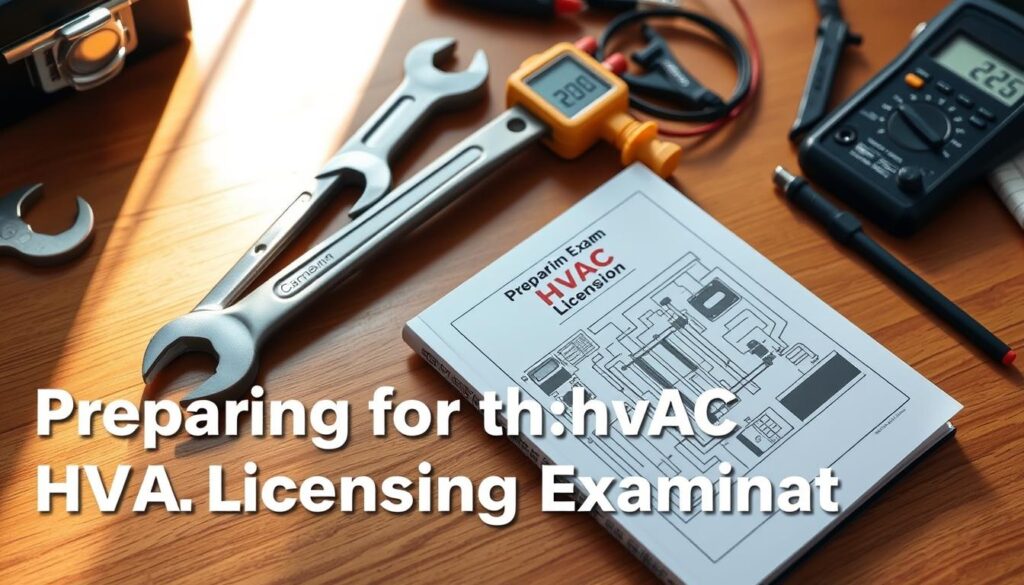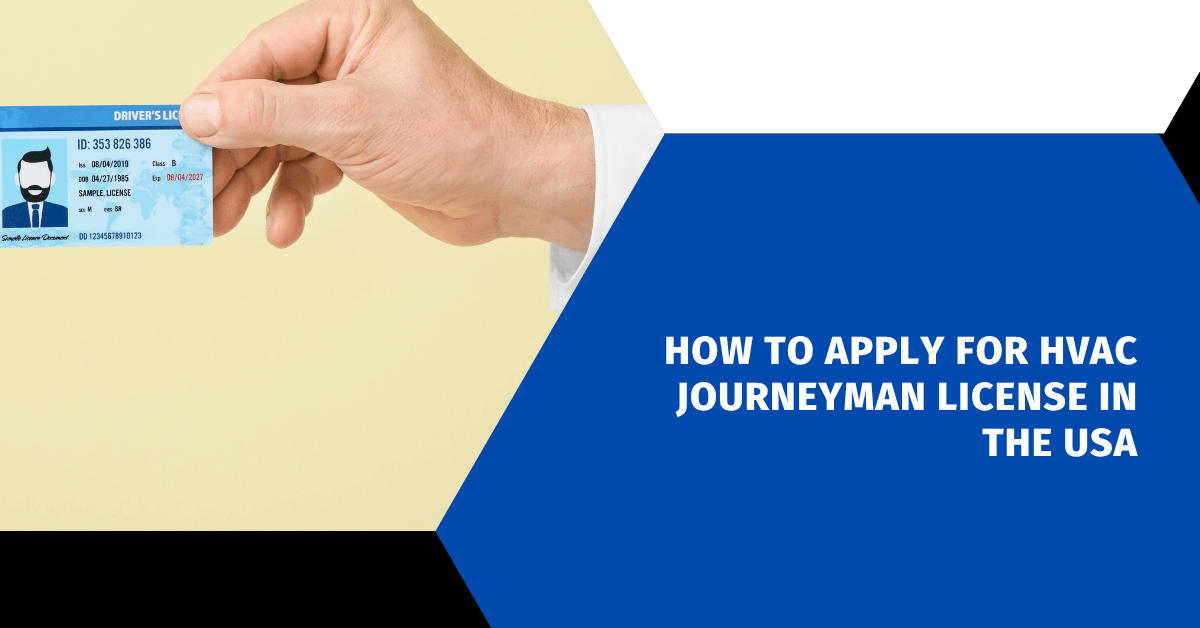Affiliate Disclosure
HVAC Guide Guys is a participant in the Amazon Services LLC Associates Program, an affiliate advertising program designed to provide a means for sites to earn advertising fees by advertising and linking to Amazon.
How to Apply for HVAC Journeyman License in the USA? Are you ready to unlock a lucrative career in the HVAC industry? It offers stability and impressive earning potential. Navigating the path to an HVAC journeyman license can be your ticket to professional success.

The HVAC industry presents an exciting opportunity for skilled professionals. With a median annual salary of $50,590 and projected job growth of 19,000 new positions by 2030, obtaining your HVAC license requirements can be a game-changing career move.
Learning how to apply for an HVAC journeyman license involves understanding complex regulatory processes, educational prerequisites, and professional certifications. This comprehensive guide will walk you through each critical step to help you achieve your professional licensing goals.
Key Takeaways
- HVAC journeyman license offers substantial career opportunities
- Median HVAC professional salary exceeds $50,000 annually
- Licensing requirements vary by state
- Professional certification enhances job marketability
- Systematic approach crucial for successful license application
Table of Contents
Understanding HVAC Licensing Requirements and Regulations
Starting your HVAC career can be tricky. There are many rules and tests you must pass. These are key to your success in the field.
The HVAC world has strict rules from the government. These rules help keep everyone safe and ensure work is done well. To become a licensed tech, you need to know these rules well.
Federal EPA Section 608 Certification Requirements
The Environmental Protection Agency (EPA) has rules for techs working with cooling systems. To apply for your HVAC license, you must meet these important federal rules:
- Core certification covering all refrigeration systems
- Type I certification for small appliances
- Type II certification for high-pressure systems
- Type III certification for low-pressure systems
- Universal certification covering all refrigerant types
State-Specific Licensing Variations
Every state has its own rules for HVAC licenses. Where you live will affect what you need to do. This includes tests, standards, and more.
Importance of Proper Licensing
Getting the right license is more than just a formality. It shows you’re a skilled HVAC tech, keeps people safe, and opens up more job chances. Employers and clients look for licensed techs. They know these techs have passed tough tests.
“Licensing shows you’re dedicated to being the best in HVAC and keeping everyone safe.”
Explore Our HVAC Shop
Looking for top-rated HVAC tools, parts, and accessories? Visit our shop and find the perfect solution for your needs.
Visit the ShopBasic Eligibility Requirements for HVAC Journeyman License
To get an HVAC journeyman license, you need to meet certain criteria. These requirements differ slightly from state to state. It’s important to know these requirements if you want to grow in the HVAC field.
Most states have simple requirements to start in HVAC. You’ll typically need to:
- Be at least 18 years old
- Have a high school diploma or GED
- Have a valid driver’s license
- Pass a background check
Starting your HVAC apprenticeship requires these basic steps. The education needed is easy to get. This makes HVAC a great career for many looking for a stable job.
Being physically fit is also key. HVAC techs need to:
- Lift heavy equipment (up to 50 pounds)
- Work in tight spaces
- Stand for long times
- Climb ladders and work at heights
While the basic needs are the same across the country, each state has its own rules for licenses. Always check with your local board to see what’s needed in your area.
Pro Tip: Start preparing early by gathering all necessary documentation and understanding your state’s specific HVAC license requirements.
Educational Prerequisites and Training Programs
Starting a career in HVAC needs careful planning and the right education. You’ll choose a training path that fits your goals and state rules. This path is key to becoming a certified HVAC pro.
Looking into HVAC certification, you’ll find many educational paths. These paths can help you move from an HVAC apprentice to a journeyman:
- Trade School Programs
- Community College Certificates
- Registered Apprenticeship Programs
- Technical Institute Training
Trade School and Community College Options
Trade schools and community colleges offer HVAC training. These programs last from 6 months to 2 years. They provide:
- Hands-on technical training
- Classroom lessons on system design
- Lessons on electrical and refrigeration basics
- Info on safety and industry standards
Apprenticeship Programs
Apprenticeships are a practical way to become an HVAC tech. They last 3-5 years. You get:
- Paid on-the-job training
- Supervised work experience
- Classroom education
- Mentorship from experts
Required Course Documentation
To apply for HVAC certification, you need certain documents. These include:
- Official transcripts
- Training program completion certificates
- Proof of apprenticeship hours
- Professional references
Pro tip: Always check with your state’s licensing board for specific document needs. Requirements can differ a lot.
How to Apply for HVAC Journeyman License
Getting your HVAC journeyman license needs careful planning and preparation. Your path to becoming a licensed HVAC journeyman has several important steps. These steps require focus and dedication.
To apply for an HVAC journeyman license, you must gather certain documents and follow a specific process. The application process includes several key parts:
- Compile all required educational transcripts
- Collect proof of work experience documentation
- Prepare professional references
- Complete state-specific application forms
- Verify EPA Section 608 certification
Each state has its own rules for HVAC certification. Your first step should be to contact your state’s licensing board. They can tell you exactly what documents you need.
“Accuracy in your application is paramount. One missed document can delay your entire licensing process.” – HVAC Professional Association
Also, think about the cost. Most states charge application fees between $50 and $250. Some places might also ask for background checks or extra verification steps.
| Application Component | Typical Requirements | Estimated Time |
|---|---|---|
| Documentation Preparation | Educational Certificates, Work Logs | 2-4 weeks |
| Application Submission | Complete Forms, Pay Fees | 1-2 weeks |
| Review Process | State Board Verification | 4-8 weeks |
Pro tip: Always keep copies of all documents you submit and check on your application status often.
Explore Our HVAC Shop
Looking for top-rated HVAC tools, parts, and accessories? Visit our shop and find the perfect solution for your needs.
Visit the ShopRequired Work Experience and Documentation
Getting from HVAC apprentice to journeyman needs good documentation and knowing about work experience. You must show your skills with verified experience that meets state standards.
To get your HVAC journeyman license, you must gather detailed work experience documents. Each state has its own rules for how many hours you need and what kind of experience is acceptable.
Minimum Hours Requirements
Most states require a certain number of work hours for a journeyman license. Here are some common requirements:
- 4,000-8,000 hours of supervised HVAC work
- Minimum 2-3 years of practical field experience
- Documented installation and repair work
Types of Acceptable Experience
Your journey from apprentice to journeyman depends on showing different work experiences, such as:
- Residential HVAC system installations
- Commercial heating and cooling repairs
- Refrigeration system maintenance
- Climate control equipment servicing
Verification Process
To confirm your work experience, you’ll need:
- Detailed employment verification forms
- Supervisor contact information
- Signed documentation of completed projects
- Proof of supervised training hours
Tracking and presenting your experience well helps you smoothly move from apprentice to licensed HVAC professional.
Preparing for the HVAC Licensing Examination
To pass the journeyman HVAC exam, you need a solid plan. You must learn both technical skills and practical knowledge. Getting an HVAC license requires a lot of study and planning.

Knowing the exam layout is key to meeting HVAC license needs. The exam tests you on several important topics:
- Technical system knowledge
- Safety procedures
- Local building codes
- Refrigeration principles
- Electrical systems
Good study habits can really help you pass. Here are some tips to prepare well:
- Sign up for detailed exam prep courses
- Use practice tests and study guides
- Join study groups with other HVAC pros
- Read technical manuals and industry news
| Exam Preparation Resource | Estimated Cost | Recommended Intensity |
|---|---|---|
| Online Practice Tests | $50-$150 | High |
| Comprehensive Study Guides | $75-$200 | Medium |
| Professional Exam Prep Courses | $300-$750 | Very High |
“Success in the HVAC licensing exam is not just about memorization, but understanding core principles and practical applications.” – HVAC Industry Expert
Pro tip: Focus on understanding underlying concepts rather than simply memorizing facts. This approach will serve you better during both the exam and your future HVAC career.
Explore Our HVAC Shop
Looking for top-rated HVAC tools, parts, and accessories? Visit our shop and find the perfect solution for your needs.
Visit the ShopInsurance and Bonding Requirements
Understanding insurance and bonding is key when getting an hvac contractor license. These steps help protect your business and meet license needs. They also safeguard against risks and financial losses for both you and your clients.
Professional HVAC contractors face several insurance and bonding rules. These rules are essential for legal and responsible operation.
General Liability Insurance
General liability insurance is vital for your HVAC business. It covers:
- Property damage protection
- Bodily injury coverage
- Legal defense expenses
- Personal and advertising injury protection
Workers’ Compensation Coverage
If you have employees, workers’ compensation insurance is a must. It pays for medical bills and lost wages if an employee gets hurt on the job.
| Coverage Type | Typical Minimum Coverage | Purpose |
|---|---|---|
| Medical Expenses | $100,000 per incident | Employee injury treatment |
| Lost Wage Replacement | 66% of weekly wages | Income support during recovery |
| Disability Benefits | Varies by state | Long-term injury compensation |
Surety Bond Requirements
Surety bonds ensure you’ll finish contracted work as agreed. The bond amount varies but usually falls between $10,000 to $50,000.
Having the right insurance and bonding shows you’re professional. It also keeps your HVAC business safe from financial risks.
License Maintenance and Renewal Process

Keeping your HVAC journeyman license up to date is key for your career. Each state has its own rules for hvac licenses. You must follow these to keep your license valid and legal.
The steps to renew your journeyman license include:
- Submit renewal application before expiration date
- Pay required renewal fees
- Complete mandatory continuing education credits
- Provide proof of current work experience
Continuing education is very important. Most states need you to take 4-16 hours of training each year. This keeps you up to date with new tech and standards.
| Renewal Cycle | Average Fees | CE Hours Required |
|---|---|---|
| 1-2 Years | $50-$150 | 4-16 Hours |
| EPA Section 608 Certification | $25-$75 | Initial Recertification |
If you miss your renewal deadline, you might face penalties or even lose your license. Keep track of your renewal needs to stay in good standing.
Stay informed about your state’s specific journeyman license renewal guidelines to ensure uninterrupted professional practice.
Explore Our HVAC Shop
Looking for top-rated HVAC tools, parts, and accessories? Visit our shop and find the perfect solution for your needs.
Visit the ShopState-Specific License Classifications and Restrictions
Getting a hvac contractor license can be tricky. Each state has its own rules for licensing. It’s important for professionals to know these differences to work in different places.
HVAC licenses are divided into main categories:
- Apprentice Level: For new starters in the HVAC field
- Journeyman Level: For those with some experience
- Master Technician: For the most experienced
- Specialty Licenses: For specific HVAC areas
Some states have stricter licensing rules than others. For example, California and New York have detailed rules. But, states like Kansas might be easier to navigate.
Important things for HVAC pros to remember include:
- Check the specific licensing rules for each state
- Know where you can work
- Keep your licenses up to date
- Track your continuing education
Plan your hvac contractor licensing carefully. Research each state’s rules well. This will help you follow the law and open up more job chances.
Conclusion
Getting an HVAC journeyman license is a big step in your career. It means you’ve met complex rules that change by state. This shows you’re serious about your work and ready for the HVAC world.
The steps to get licensed need careful planning and prep. By following each state’s rules, you lay a solid base for your career. Every step, from school to exams, gets you ready to work well and legally.
Getting your HVAC journeyman license can lead to many job chances. It shows you have the skills and dedication needed. Keep up with local laws, keep your certifications current, and learn new things in HVAC.
Your path to becoming a licensed HVAC pro shows your skills and drive. See each step as a chance to grow and have a fulfilling career in HVAC.

